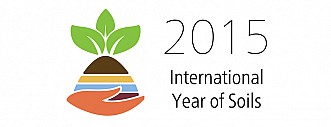August 25, 2015
International Year of Soils

As we approach the ninth month of the International Year of Soils, I thought I'd again reflect on the importance of soil and the role compost plays in healthy soils. Unfortunately, there’s been little coverage on the Year of Soils in the media. Even more unfortunately, it seems when there’s talk of food scrap diversion the focus is primarily on composting or anaerobic digestion as a means of reducing the impact of food scraps being disposed in landfills.
Often the benefits of compost as a soil enhancer are but a footnote to composting as a means of waste reduction. In talking with agricultural professionals, compost frequently takes second place to the use of synthetic fertilizers, if discussed at all, when it comes to conventional agriculture.
Soil is a nonrenewable resource which is under threat around the world. It can take up to 1,000 years to form just one centimeter of top soil. Expanding cities and suburbia, deforestation, unsustainable land use and management practices, pollution, overgrazing, climate change, and more contribute to soil degradation. According to Food and Agriculture Organization of the United Nations, “the current rate of soil degradation threatens the capacity to meet the needs of future generations.”
Sustainable soil and land management is integral to maintaining a productive food system, a healthy environment, and nourishing agricultural and rural communities. Soils play a key role in the carbon cycle, and as such help to reduce the impacts of climate change. Healthy soils store and filter water helping to improve our resiliency to flooding and drought.
Making compost to enhance and build soils has been practiced by societies across the globe for hundreds of years. Unfortunately in much of the world, including the U.S., composting on agricultural land has all but disappeared. Following World War II composting and the use of compost to build soils gave way to the ever increasing use of chemical fertilizers.
Yes, fertilizers have allowed for unprecedented growth in food production around the world. However, chemical fertilizers are derived primarily from petroleum products. As such they are inherently unsustainable and contribute to our carbon footprint. Fertilizers do not help build soil. If soils are washed away by rain or damaged or lost through over tilling or other agricultural practices, fertilizers are not going to replenish the lost soil. Nor do fertilizers add to the micronutrients and life that is abundant in healthy soils.
Watersheds around the world are impacted by excessive nitrogen and phosphorus levels due to nutrient pollution caused by excess fertilizer run-off from farms and other nonpoint sources. Commercial fertilizers deplete nutrient resources over time as chemical nutrients are lost through crop removal and leaching without being replaced. This contributes to soil degradation and nutrient imbalances which threaten sustainable farming practices.
Fortunately, composting is making a slow comeback as we focus our attention on the impact organics disposal has on greenhouse gas production and unnecessarily filling our landfills. Growing attention on the impact of industrial agricultural has on the environment and rising concerns over chemical use in growing our food has helped to refocus attention on the need for healthy soils and the role composting can play.
Undoubtedly there will be more to come on compost and the importance of soil in the NERC Blog. In the meantime, I encourage you to watch this great video on soil.
By Athena Lee Bradley


Comments (0)
Add a Comment